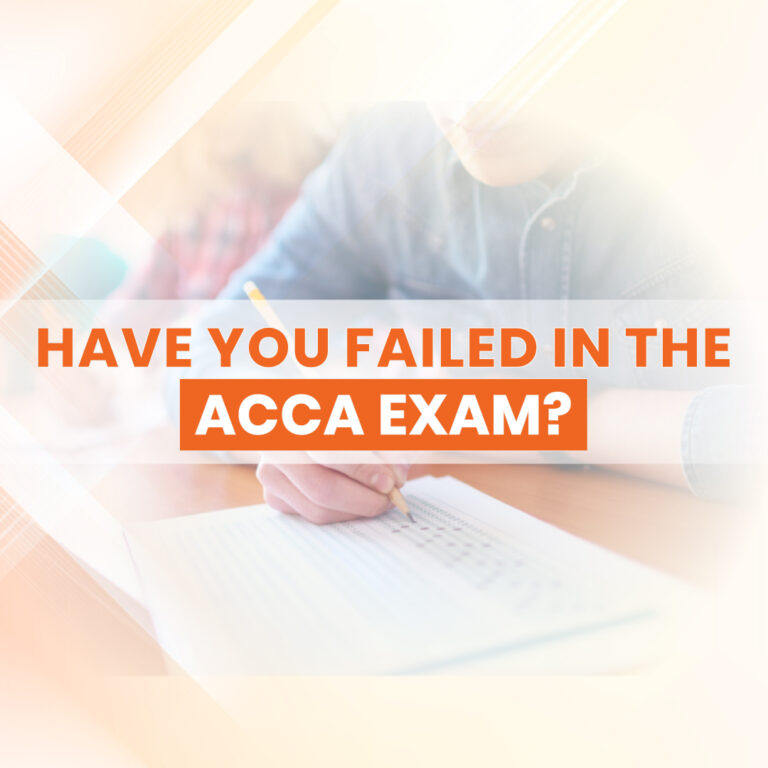Have You Failed in the ACCA Exam? These Habits might be the Reason…
Qualifying for an ACCA exam is quite tough. Hence, failing the ACCA exams is not uncommon. However, if you study actively and smartly and avoid procrastination, there are numerous strategies to improve your odds of qualifying for any ACCA exam on your first attempt. The secret is to become proficient in the subject, become accustomed to the format and time limits of the exam, and develop your abilities and self-assurance so that you can demonstrate them successfully on exam day. By committing to habit monitoring and regularly using general knowledge, you can avoid failing the ACCA exam. Let’s look at some of the major habits that might be the reason you failed the ACCA exam.
Start Studying Anywhere
Students’ capacity to absorb and retain information can be greatly impacted by the setting in which they study. An hour spent studying in a library is more productive than four hours spent studying in the TV lounge. A setting that is busy or noisy might be distracting and make it hard to concentrate.
To build the right environment for study, establish a focused and well-structured study space, make sure there is adequate lighting, locate a peaceful area away from interruptions, and keep all required study supplies close at hand. Efficiency and concentration can be improved by a neat workspace.
Getting Excessive Amounts of Information
Many students try to commit a lot of knowledge to memory without really understanding it. A lot of students try to commit a lot of information to memory without really grasping the ideas. Students cannot learn well if they attempt to absorb too much knowledge at once. It might cause misunderstandings and hinder memory recall.
Focus on comprehending the fundamental ideas and concepts and consider quality precedence over quantity, consider dividing the content into manageable portions, and concentrating on a single subject at a time. Make use of study resources that provide succinct, simple explanations of subjects. To help you retain what you’ve learned, take breaks.
Always Overburden
Since ACCA students have a lot of material to learn, it’s easy to feel overwhelmed by the sheer volume of information covered in ACCA exams. You must avoid becoming overburdened by the amount of work you have to accomplish.
Divide the content into smaller, easier-to-handle portions and a lots enough time for every subject. Making a study plan will enable you to go over everything without being overburdened. Set priorities for your study topics and work on each one separately.
Recall that it is preferable to move slowly and steadily rather than quickly.
Examining Responses Before Attempting the Question
It’s common for some students to go over the answers before trying to answer exam questions. However, it is a common student inclination to view answers before attempting the question; this disrupts the learning process and can result in poor performance. As a result, it is not a good method for students like you to learn or remember knowledge. Start by giving the questions your best effort and exploring the areas for improvement. Go back and review your responses later and contrast them with the sample responses you wrote. This will strengthen your comprehension of the subject matter and assist you in identifying areas in which you need to improve.
Procrastination
A lot of students see ACCA as a qualification, much like other college or university courses, especially those who are just beginning their program. Exams can be passed with only a little extra effort near the exam. But this is not how you pass the ACCA exam. I’ll finish it later, tomorrow. Guys, set a schedule and follow it. Later on, when you have months of lectures to learn in a week, the “pain of sitting down to revise for a few hours and following your schedule is a lot less pain than you will feel.“
Ignoring the Theory Portions of the Syllabus
ACCA exams often consist of both descriptive and numerical questions (some exams have just theoretical questions). However, it has been observed that a large number of students spend most of their preparation time practicing numerical problems and do not take the theoretical portions seriously. It is among the main causes of low passing scores on exams like the MA, PM, FM, and others. As you study for your tests, be sure to practice descriptive questions. Keep in mind that reading about the subject is not enough; you also need to practice writing about it.
Last Verdict
These are a few habits that might be the reason why you failed the ACCA exam. No doubt, ACCA examinations are difficult, but with the right study techniques, you can pass them. Trust yourself and keep working. Anything you set your mind to, you can accomplish. Mirchawala is there to support you in your ACCA learning journey. Our expert teaching can guide you throughout the journey. Contact us to know more!
Frequently Asked Questions (FAQs)
Q: Why do people fail in ACCA?
Ans: It might be that you were not diligent about your study time, that you tried question spotting, which doesn’t work, or that you wasted time taking notes without learning anything. According to experts, students who pass generally devote 150 hours or more to their studies for each paper.
Q: How to deal with ACCA failure?
Ans: On the ACCA Global website, you can receive insightful examiner reports after failing an exam that will change the way you approach every subject. You can adjust your approach by using the feedback to gain insight into what the markers are seeking.
Q: Why is ACCA so hard to pass?
Ans: The extensive breadth of the certification is reflected in the sizeable amount of study material included in the ACCA curriculum. Comprehensive Reading Materials: There are study guides, revision aids, and practice questions specific to each of the 13 exams.
Q: What is the fastest way to finish ACCA?
Ans: Working and studying together is the fastest approach to qualifying for the exam. You might be eligible in as short as three or four years if you do.





